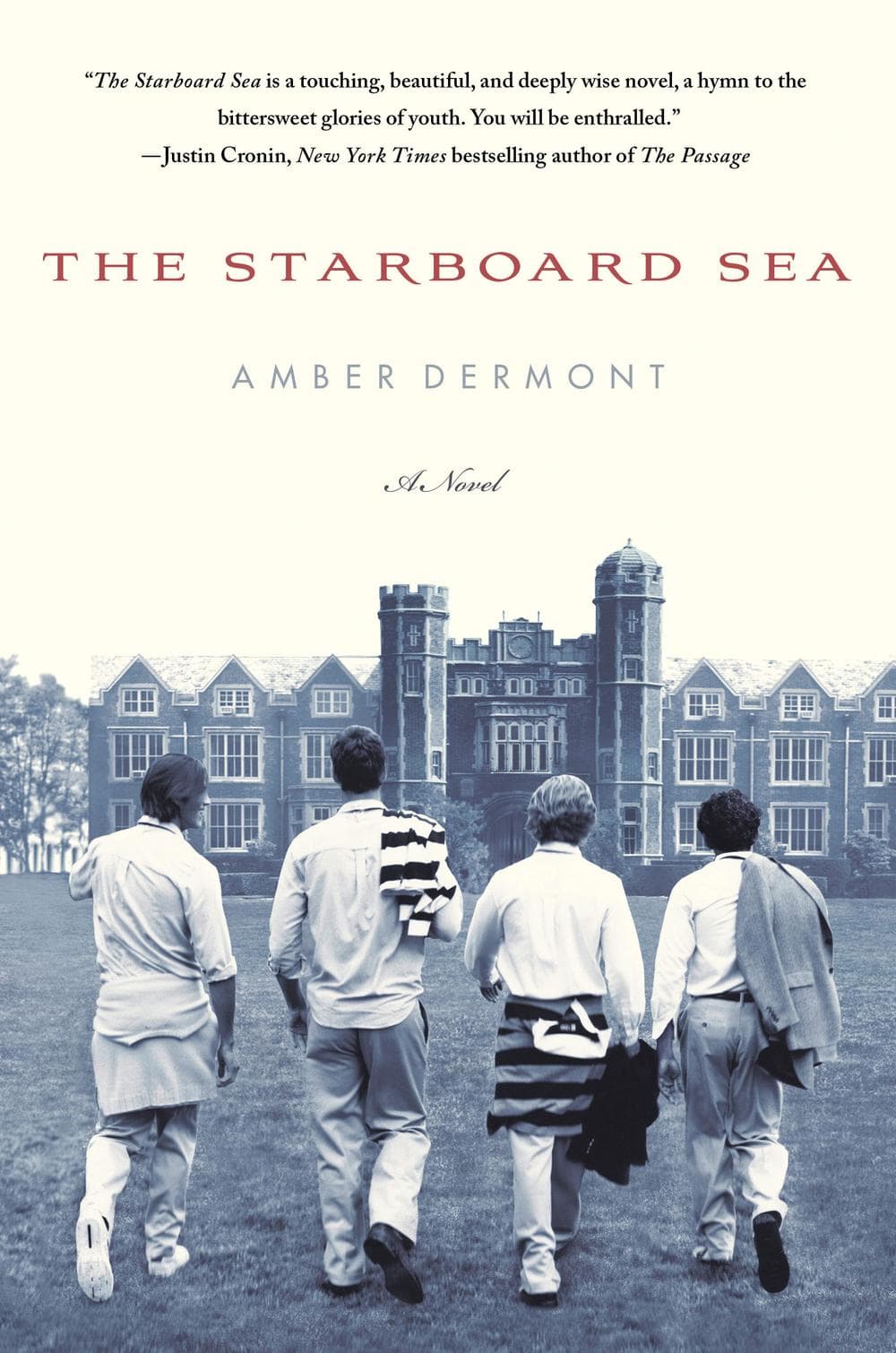Advertisement
Author Taps Experience With Prep School Privilege In 'Starboard Sea'
Resume
Amber Dermont's debut novel "The Starboard Sea" has been highly praised in the New York Times, Washington Post, and Huffington Post for its portrayal of privileged but troubled teenagers set against the 1987 Wall Street crash. The book centers around Jason, a high school junior with a love and talent for sailing.
After his best friend and sailing buddy Cal commits suicide, Jason is sent to Bellingham Academy, a refuge for well-to-do young men and women who've been kicked out of other schools. At Bellingham, Jason meets Aiden, a young woman with her own ugly past.
Though the two are drawn to each other, Jason is still haunted by memories of Cal.
Dermont tells Here & Now's Robin Young that she's very familiar with this world of privilege.
She went to a prep school as well as taught at one and she says she was always fascinated by the students' sense of imagination and the misadventures they were able to create for themselves.
Book Excerpt: 'The Starboard Sea'
By: Amber Dermont
 Dad and I said good-bye in front of Whitehall, my new dormitory. Before he had a chance to drive off, I decided to cost my family something more and reminded Dad that I needed an allowance. He slipped a leather folio from his sport coat, tore out a blank check, and signed it. “I trust you to fill in an appropriate amount.” Dad told me to open a bank account first thing in the morning and then to call his current secretary, his latest Gayla, to report the exact figure I’d deemed necessary for my financial survival.
Dad and I said good-bye in front of Whitehall, my new dormitory. Before he had a chance to drive off, I decided to cost my family something more and reminded Dad that I needed an allowance. He slipped a leather folio from his sport coat, tore out a blank check, and signed it. “I trust you to fill in an appropriate amount.” Dad told me to open a bank account first thing in the morning and then to call his current secretary, his latest Gayla, to report the exact figure I’d deemed necessary for my financial survival.We scanned through the car one last time to make sure I had unloaded all my belongings.
“Do me a favor?” he asked. “Try to like this place.”
“They’re all the same, right?”
“Don't lose that check.” He looked me over. “Buy yourself a pair of socks, and call your mother.”
“Anything else?”
“Be sure to tell us if you need something.”
I knew we weren't going to embrace, but it surprised me that my father didn't hold out his hand or pat my back or wish me one last happy birthday. He nodded once and settled into the driver's seat.
There wasn't much for me to unpack, but the thought of hanging blue button-downs in my closet and fun-tacking posters and tapestries to the bare walls made me feel claustrophobic. I decided to go for a walk.
I followed the local wind, the sea breeze, and made my way through the town center, passing a post office, a general store, a bank, and an array of restaurants and gift shops. Bellinghem was a one-street venue. Everything the town had to offer sat lined up in a neat shooting gallery. Oval-shaped wooden signs swung outside the shops. Names stenciled in gold leaf. the Singing Lighthouse, the Charmed Dolphin the Lost Mermaid. I figured these businesses catered mainly to parents visiting their children on weekends. Quickly, I thought of my own store names in defense: the Toxic Oyster, the Slutty Sea Nymph, the Nauseated Fishmonger. I imagined a time in mid-autumn when my parents would drive up for the weekend. My mother would make us all wait while she picked out some over priced silver knickknack in one of the gift stores. The three of us would then walk down by the waterfront, speaking only to point out different yachts in the harbor. In the evening, at dinner, Dad would order a bottle of his favorite Barolo and make sure that I had half a glass. This is how it had been at Kensington. Year after year. But no one in my family had mentioned any visits.
After a mile or so of passing saltbox houses, the road turned into a long camel stretch of sand. A groin made of orange and purple stones ran into the ocean and divided the beach into two sections. My best friend Cal and I had spent summers together in Maine hurdling and jumping off every big rock we could find. I always seemed to be drawn to jagged edges.
The high tide rushed in and washed over the break. That far from shore, only the sharp tips of the rocks were visible, and a strange figure stood a hundred yards out, surrounded by waves, with no discernible path behind itself. For a brief moment, I thought it was a cormorant. The tall black birds have no oil on their feathers, so they stand with wings unfolded, waiting for the sun to dry their plumage. But as I walked closer, I saw it was a person. Even closer, and I knew it was a girl. She had a bundle of curly hair streaming behind her. The wet feathers turned into the folds of a long, colorful skirt. Her arms rested at her sides. She belonged on the prow of an ancient vessel. I couldn't see her face, but I imagined it. I'd been to Greece and seen broken statues. A tour guide told me that the heads were removed because the Greeks felt they were too beautiful for the conquering Romans to see. Had even one of those faces survived, it would have been hers.
For a few minutes, I just stood and watched her. She never moved. The tide continued to rise, and I knew that she risked being trapped. Risked being washed out by a rogue wave. With the break flooded, there would be no way for her to walk back to shore. Even a strong swimmer could be pulled out into the rip.
I waded into the cool water, pushing out with slow, deliberate steps. Waves lapped against my pant legs and sprayed the edges of my jacket. The sand fell loose, collapsed, and tried to swallow one of my loafers. Unwilling to lose a shoe, I pulled away from the suction and gripped my toes tightly into the soles. Before continuing, I thought quickly and removed my jacket, holding it above my head. I walked, pressing down with only my heels. Shivering and strutting in delayed motion, I looked ridiculous. The girl stood farther out than I had judged, and just as I thought I was getting closer, the horizon changed. Expanding the distance between us.
“Hello,” I shouted. “The tide's coming in.”
She didn't hear me, or else didn't feel like responding.
“The break's flooded,” I yelled even louder. “You'll have to paddle in.” I was still a good hundred yards from her, but my voice echoed and rang out over the waves. “Hello. Over here. Can you swim?” If she couldn't, I'd need to dive in and carry her back. “If you'd just nod or something to let me know.” Her face remained hidden, with only a hint of profile. A long, narrow nose and tall forehead. “I'm a strong swimmer. I can hold you.” She offered no response. Maybe she was deaf, or foreign. “Do you want me to come out? Hey.”
The “hey” got her attention. Just impolite enough. Just slightly menacing. I wanted to take it back and let her know I was concerned, not rude. She turned around quickly and looked to the beach. Then, like a gymnast preparing for a run of flips and tumbles, she skipped over the water in double time. From my view, she appeared to dance on the ocean. The rocks were arranged underneath her, just inches below the surface. Not the life-threatening flood I'd imagined. She hadn't been in danger. Not really. I stood, wet up to my hips, watching her reach shore.
Once she hit the sand, she hesitated and looked back. I took my jacket off my head and straightened my necktie. She smiled to me across the water, waved, and cried out, “Thank you.”
“But I didn't do anything,” I shouted.
“You have no idea.” She waved again and started up the beach. Her voice didn't sound distorted or strained, but close, as though she was in the water beside me.
“Wait,” I told her.
I tried to run and catch up but managed only to splash myself and drop my jacket. The only untouched part of me was the inside knot of my tie. I felt like a puddle.
The girl was safe and dry and gone.
Excerpted from "The Starboard Sea," Copyright (c) 2012 by Amber Dermont.
Guest:
- Amber Dermont, author "The Starboard Sea"
This segment aired on April 10, 2012.